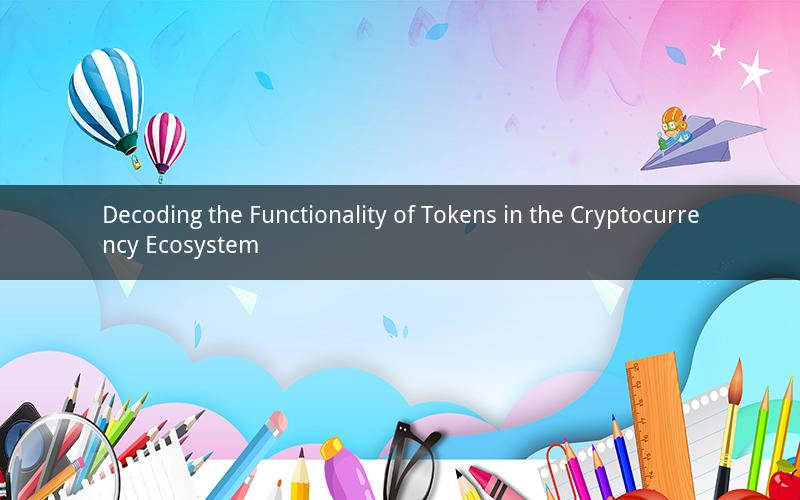
In the rapidly evolving world of cryptocurrencies, tokens have emerged as a crucial component, enabling various functionalities and interactions within the ecosystem. This article delves into the intricacies of how tokens operate in the cryptocurrency domain, exploring their creation, distribution, and utilization. By understanding the mechanics behind tokens, we can appreciate their significance and potential impact on the future of digital currencies.
Understanding Cryptocurrency Tokens
To comprehend how tokens work in cryptocurrency, it is essential to understand what they are. A cryptocurrency token is a digital asset that operates on a blockchain network, often representing a unit of value or a right within a specific ecosystem. Unlike cryptocurrencies like Bitcoin or Ethereum, tokens are typically issued by organizations or platforms and serve specific purposes.
Token Creation and Distribution
The process of creating and distributing tokens involves several key steps:
1. Token Generation Event (TGE): The TGE marks the launch of a new token, where the initial supply is generated and distributed. This event can be public or private, depending on the project's strategy.
2. Initial Coin Offering (ICO): An ICO is a fundraising mechanism where tokens are sold to investors in exchange for legal tender or other cryptocurrencies. It is a common method for token distribution and can generate significant capital for projects.
3. Token Sale: Similar to an ICO, a token sale involves selling tokens to investors. However, it does not necessarily require a new project launch and can be used to fund existing projects.
4. Private Sale: In a private sale, tokens are sold to a select group of investors, often including venture capitalists, influencers, and other stakeholders. This method allows for more controlled distribution and can provide valuable feedback on the project.
5. Public Distribution: Once the initial supply of tokens is generated, they can be distributed to the public through exchanges, wallets, or other platforms.
Token Utilization and Value
Once tokens are in circulation, their utilization and value depend on the specific purpose for which they were created. Here are some common use cases:
1. Utility Tokens: These tokens are designed to facilitate transactions within a specific ecosystem. For example, Ethereum's native token, Ether (ETH), is used to pay for transaction fees on the Ethereum network.
2. Security Tokens: Security tokens represent ownership or rights in an underlying asset, such as shares in a company or real estate. They are regulated as securities and can be traded on exchanges.
3. Equity Tokens: Equity tokens represent ownership in a company and are typically used in initial exchange offerings (IEOs) or private placements. They offer investors a stake in the company's success.
4. Governance Tokens: These tokens enable users to participate in the decision-making process of a platform or project. Holders can vote on proposals, influence the direction of the project, and potentially receive rewards for their contributions.
5. Loyalty Tokens: Loyalty tokens are used to reward users for their participation or engagement within a platform. They can be exchanged for goods, services, or other rewards.
The Value of Tokens
The value of a token is influenced by various factors, including:
1. Supply and Demand: Like any other asset, the value of a token is determined by the balance between supply and demand. If demand for a token increases, its value will likely rise, and vice versa.
2. Market Sentiment: The overall sentiment in the cryptocurrency market can significantly impact token prices. Positive news or developments can drive up prices, while negative news can lead to declines.
3. Project Viability: The success and long-term viability of a project can affect token value. Investors often consider factors like the team's expertise, the project's roadmap, and its potential for adoption.
4. Regulatory Environment: The regulatory landscape can also impact token value. Projects that comply with regulations are more likely to attract investors and maintain stable prices.
5. Network Effects: The more users and participants a token's ecosystem has, the greater its potential value. Network effects can create a self-sustaining cycle, where increased adoption leads to higher demand and higher prices.
In conclusion, understanding how tokens work in the cryptocurrency ecosystem is crucial for investors, developers, and enthusiasts alike. By exploring the creation, distribution, utilization, and value of tokens, we can appreciate their role in the digital currency revolution. As the landscape continues to evolve, staying informed about the mechanics of tokens will be essential for navigating the ever-changing world of cryptocurrencies.
Questions and Answers:
1. Q: What is the difference between a cryptocurrency and a token?
A: Cryptocurrencies, like Bitcoin and Ethereum, are standalone digital currencies, while tokens are digital assets issued by organizations or platforms to represent value, rights, or utilities within a specific ecosystem.
2. Q: Can tokens be used for everyday transactions like fiat currencies?
A: While some tokens, such as utility tokens, can be used for everyday transactions, their adoption is limited compared to fiat currencies. Most tokens are used within specific ecosystems or for specific purposes.
3. Q: How do security tokens differ from utility tokens?
A: Security tokens represent ownership or rights in an underlying asset, like shares in a company, and are regulated as securities. Utility tokens are used for transactions within a specific ecosystem and are not typically regulated as securities.
4. Q: What factors influence the value of a token?
A: The value of a token is influenced by factors like supply and demand, market sentiment, project viability, regulatory environment, and network effects.
5. Q: Can tokens be created without an Initial Coin Offering (ICO)?
A: Yes, tokens can be created and distributed without an ICO. Alternative methods include private sales, token sales, and public distribution through exchanges or wallets.